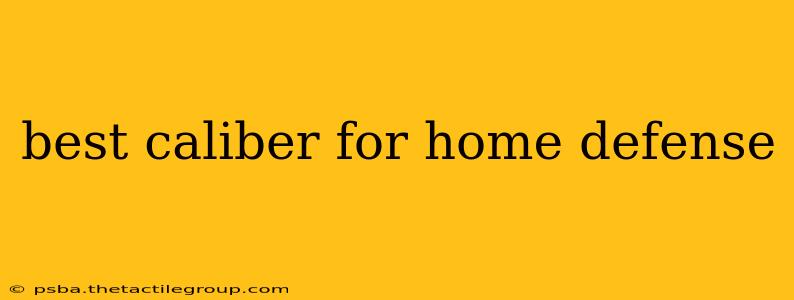Choosing the right caliber for home defense is a crucial decision, impacting your safety and the effectiveness of your response in a high-stress situation. This isn't a decision to be taken lightly; it requires careful consideration of various factors, including personal experience, firearm familiarity, and the specific needs of your home environment. This guide explores popular calibers, their advantages and disadvantages, and helps you make an informed choice.
Factors to Consider Beyond Caliber
Before diving into specific calibers, let's address crucial factors often overlooked:
- Shot Placement: Accuracy and precise shot placement are paramount. The best caliber is useless if you can't hit your target. Practice is crucial, regardless of your chosen caliber.
- Recoil Management: Excessive recoil can hinder follow-up shots, especially in a stressful situation. Consider your ability to handle recoil comfortably.
- Ammunition Availability: Ensure the chosen caliber and ammunition type are readily available in your area.
- Firearm Familiarity: Choose a caliber you're comfortable and proficient with. Practice consistently to maintain proficiency.
- Overpenetration: A significant concern in home defense, overpenetration means the round passes through the intended target and potentially harms innocent bystanders or damages property. Caliber selection plays a role in mitigating this risk.
- Legal Considerations: Familiarize yourself with local and state laws regarding firearm ownership and ammunition.
Popular Calibers for Home Defense: A Detailed Look
Several calibers consistently rank highly for home defense, each with its own set of pros and cons:
9mm: A Versatile and Popular Choice
The 9mm is a very common and widely used caliber for home defense. It offers a good balance between manageable recoil, stopping power, and magazine capacity. Many readily available handguns and carbines chamber this round.
Pros:
- Moderate Recoil: Easier to control, allowing for faster follow-up shots.
- High Capacity Magazines: More rounds available in a single magazine.
- Wide Availability: Ammunition is plentiful and relatively inexpensive.
Cons:
- Stopping Power Debate: While generally effective, the stopping power of 9mm is sometimes debated, and performance can vary based on ammunition selection.
.45 ACP: Significant Stopping Power
The .45 ACP boasts significant stopping power, often cited as superior to 9mm. It's a large caliber round, resulting in a heavier recoil.
Pros:
- High Stopping Power: Known for its ability to incapacitate a threat quickly.
Cons:
- Heavy Recoil: More challenging to manage, especially for novice shooters.
- Lower Capacity Magazines: Fewer rounds per magazine compared to 9mm.
.40 S&W: A Middle Ground
The .40 S&W aims to strike a balance between 9mm and .45 ACP, offering a compromise between recoil and stopping power.
Pros:
- Balance of Recoil and Stopping Power: A middle ground between the 9mm and .45 ACP.
- Wide Availability: Ammunition is widely available.
Cons:
- Snappy Recoil: Some shooters find the recoil sharper than 9mm.
12 Gauge Shotgun: Powerful, but Requires Skill
The 12 gauge shotgun is a formidable home-defense weapon, delivering devastating stopping power with a spread of pellets. However, it requires significant training and skill to use effectively.
Pros:
- Exceptional Stopping Power: High likelihood of incapacitating a threat.
- Less Penetration Risk (with appropriate ammunition): Buckshot pellets tend to spread impact, reducing overpenetration compared to some handgun rounds.
Cons:
- Significant Recoil: Substantial recoil can be challenging to manage.
- Requires Training: Proper aiming and handling are essential for safe and effective use.
- Limited Capacity: Lower magazine capacity than many handguns.
.223/5.56 NATO: Carbine Option
For those comfortable with carbines, the .223/5.56 NATO round offers significant reach and stopping power, especially with suitable ammunition. However, overpenetration is a greater concern.
Pros:
- Greater Reach: Effective at longer ranges than handguns.
- High Velocity: Rapid projectile travel.
Cons:
- Overpenetration Risk: Higher chance of rounds traveling through walls and impacting innocent bystanders.
Conclusion: The Best Choice is Personal
Ultimately, the "best" caliber for home defense is highly subjective. There's no one-size-fits-all answer. The most effective caliber depends on individual factors, including experience, physical capabilities, and personal preferences. Thorough research, professional training, and careful consideration of the factors discussed above are crucial in making this important decision. Consult with firearms experts and law enforcement professionals to gain further insights tailored to your specific needs and circumstances. Remember that responsible gun ownership and regular practice are paramount for safe and effective home defense.

